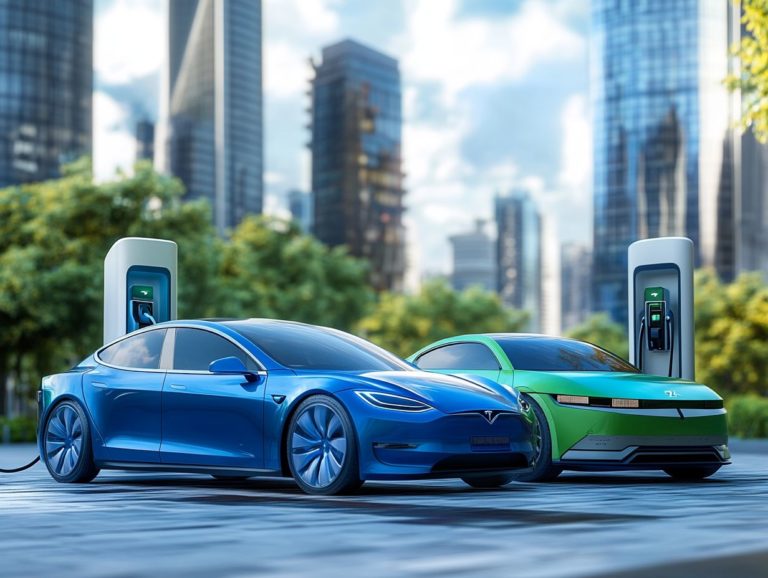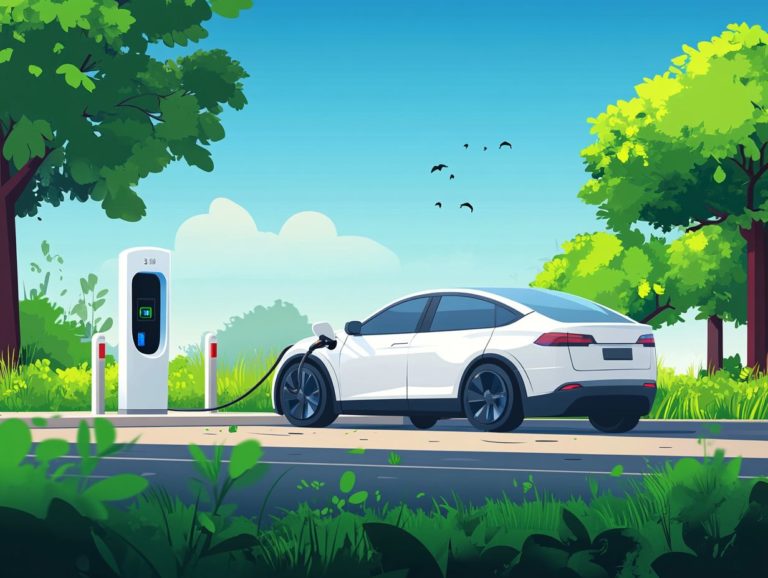do electric vehicles require special maintenance?
Electric vehicles (EVs) are transforming the landscape of transportation, seamlessly merging advanced technology with sustainability. As interest in their environmental benefits and cost savings grows, you might find yourself curious about the maintenance needs of these innovative vehicles.
This article delves into the myriad advantages of EVs, highlighting their positive environmental impact alongside the financial benefits of ownership. You ll discover essential maintenance tasks and clear up common misconceptions, all designed to equip you with the knowledge to care for your electric vehicle effectively.
Whether you re a dedicated EV enthusiast or simply intrigued by the concept, this guide offers valuable insights into the intricacies of electric vehicle maintenance.
Contents
- Key Takeaways:
- Advantages of Electric Vehicles
- Maintenance Requirements for Electric Vehicles
- How to Properly Maintain an Electric Vehicle
- Common Misconceptions about Electric Vehicle Maintenance
- Frequently Asked Questions
- Do electric vehicles require special maintenance?
- What kind of maintenance do electric vehicles need?
- Do electric vehicles have fewer maintenance needs compared to gasoline vehicles?
- How often do I need to maintain my electric vehicle?
- Is maintenance for electric vehicles more expensive than gasoline vehicles?
- Can I perform maintenance on my electric vehicle myself?
Key Takeaways:
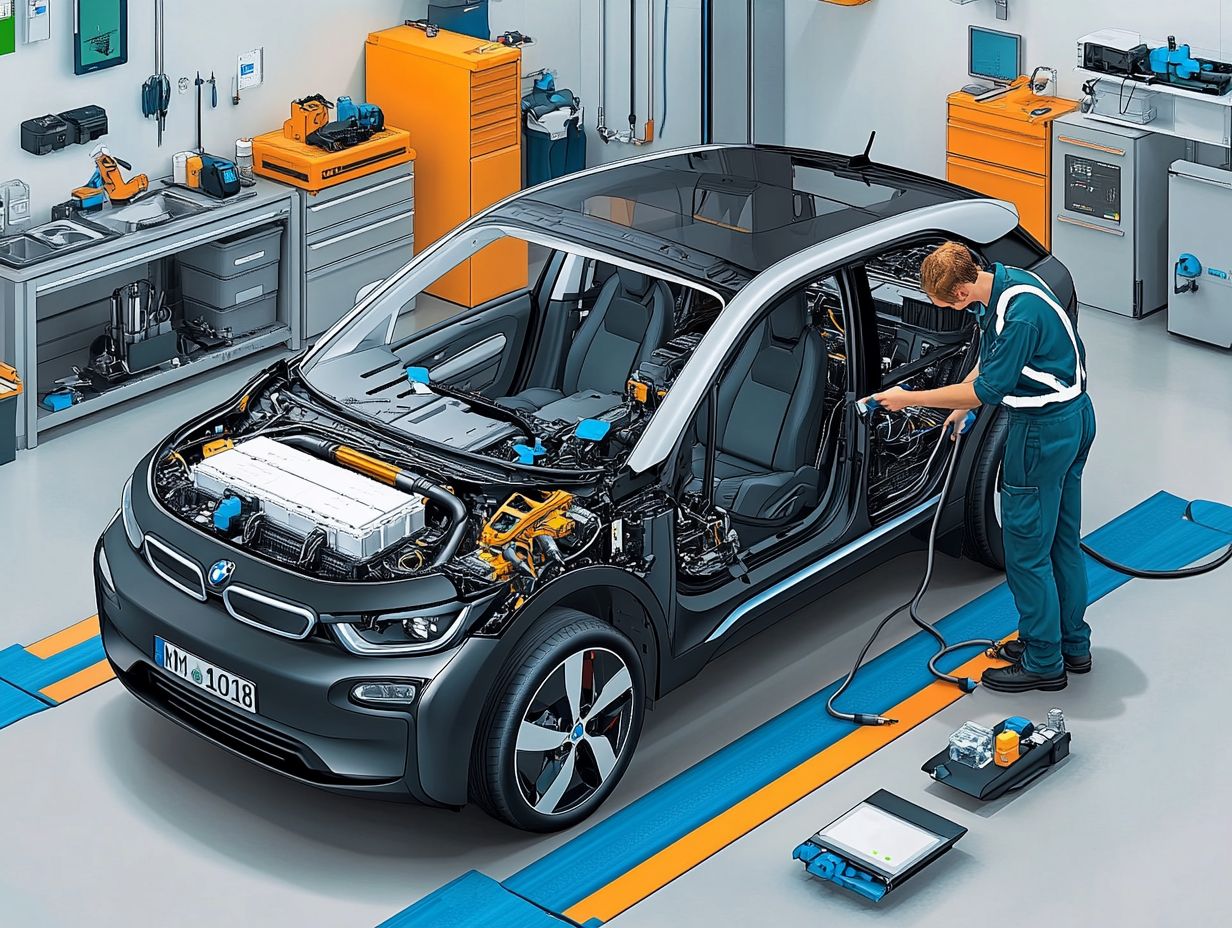
Regular maintenance, like checking tires and brakes, is key for EVs. Pay special attention to battery care for longevity. If you’re curious about how electric vehicles handle repairs, you’ll find that they offer significant cost savings in the long run, including lower maintenance costs due to fewer moving parts and less frequent service needs.
Discover the World of Electric Vehicles!
Electric vehicles (EVs) represent a remarkable evolution in automotive technology, harnessing electricity as their primary energy source. This offers you a cleaner alternative to traditional gasoline cars. Their popularity has surged thanks to energy-efficient features, a reduced environmental impact, and groundbreaking advancements, such as systems that recharge the battery while you drive.
Models like Tesla exemplify this innovation, while plug-in hybrids seamlessly blend the benefits of electric power with gasoline engines, providing you with versatile options for eco-friendly solutions.
You can categorize electric vehicles into three main types:
- Battery electric vehicles (BEVs), which rely solely on electric power;
- Plug-in hybrid electric vehicles (PHEVs), which offer both electric and gasoline options;
- Fuel cell electric vehicles (FCEVs), which utilize hydrogen to generate electricity.
The advantages of these vehicles extend well beyond lower emissions. You ll also enjoy reduced maintenance costs and the sheer convenience of charging at home.
Automotive leaders like Nissan and Chevrolet are stepping into the market with competitive offerings, showcasing a strong commitment to sustainable transportation options that resonate with environmentally-conscious consumers like you.
Advantages of Electric Vehicles
Electric vehicles (EVs) present a host of advantages over traditional gasoline cars, making them an increasingly appealing choice for discerning consumers like you.
The benefits are substantial, starting with their positive environmental impact think reduced greenhouse gas emissions and lower levels of air pollution. You ll also enjoy cost savings, thanks to lower fuel and maintenance expenses made possible by their energy-efficient engines.
EVs also provide a quieter driving experience, which helps reduce noise pollution. Let s not forget the enticing tax credits that can further incentivize your transition to an electric vehicle, making the switch even more compelling.
Ready to make the switch? Explore your options today and join the electric vehicle revolution!
Environmental Benefits
The environmental benefits of electric cars are truly remarkable. They produce zero tailpipe emissions, which dramatically reduces air pollution compared to gasoline vehicles. This leads to better air quality, especially in urban settings.
By choosing electric vehicles, you re not just making a smart choice for yourself; you’re also playing a crucial role in the fight against climate change. These cars help mitigate problems like wildfires, which traditional vehicle emissions exacerbate, promoting a healthier planet.
When you look at the bigger picture, electric vehicles do more than just cut down on harmful pollutants. They also help lower greenhouse gas emissions, a significant contributor to global warming. As more people transition to electric vehicles, the collective impact can lead to a noticeable reduction in smog in cities and a decrease in respiratory health issues.
By enhancing energy efficiency and leveraging renewable energy sources, electric cars contribute to a more resilient energy grid. Embracing electric mobility is a vital step toward fostering sustainable lifestyles, paving the way for a cleaner environment and reducing triggers for extreme weather events like wildfires.
Cost Savings
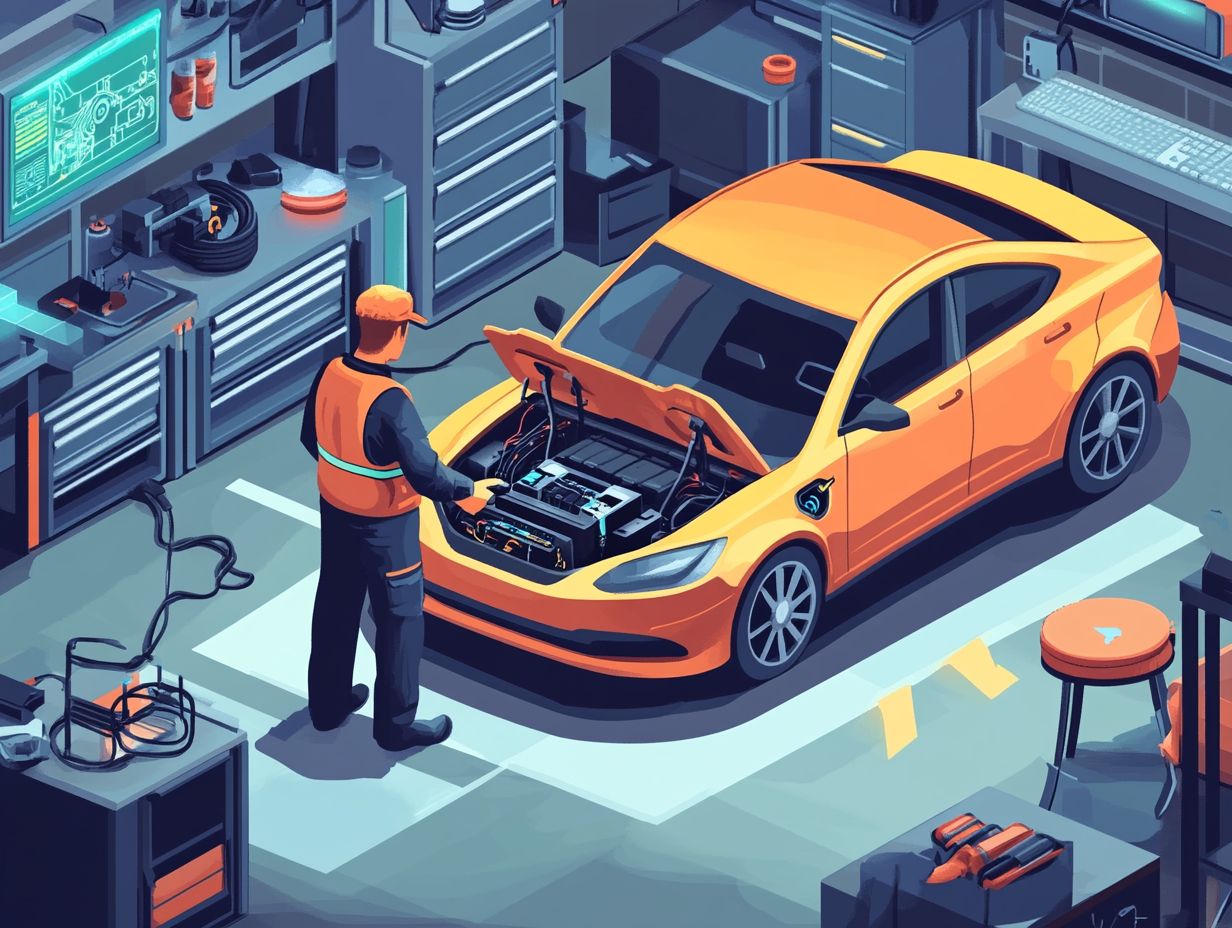
Cost savings associated with electric vehicles can be substantial. They generally come with lower operating costs compared to gasoline cars due to reduced maintenance needs think fewer oil changes and brake fluid replacements and lower energy costs for charging.
Electric vehicle expenses are often offset by tax credits and incentives. The longevity of components like the big battery can further enhance the financial benefits of your investment.
The energy efficiency of electric vehicles is a major advantage. They convert a greater percentage of energy from the grid to power at the wheels. This not only cuts down on fuel costs but also lessens your reliance on fluctuating gas prices.
In many regions, there are tax incentives, including rebates and exemptions, available for both new and used EV purchases. This makes the decision to go electric even more attractive.
The combination of these advantages makes a compelling case for you to consider making the switch. Enjoy long-term savings while also contributing to environmental sustainability. Switch to electric today and start saving money!
Maintenance Requirements for Electric Vehicles
Maintaining an electric vehicle requires attention to several key aspects for optimal performance and longevity. This maintenance differs significantly from traditional gasoline cars, especially considering the future of electric vehicle maintenance.
Focus on key maintenance tasks, including regular service appointments that concentrate on components like tires, brakes, and the big battery.
Don’t forget to perform routine checks on car fluids, such as wiper fluid and brake fluid. Following a comprehensive maintenance schedule is crucial for enhancing your driving experience and minimizing repair costs.
Basic Maintenance Tasks
Basic maintenance tasks for your electric vehicle involve straightforward procedures. Regular tire rotations help maintain optimal tire pressure, periodic checks on the air filter guarantee clean airflow, and inspecting brake pads for wear and tear is essential.
Plus tire rotations should ideally happen every 5,000 to 7,500 miles. Monitoring tire pressure is crucial as proper inflation directly affects handling and energy efficiency. Evaluate the air filter at least once a year to ensure clean air circulates in the cabin, improving overall air quality.
Brake pads deserve your attention every six months, as worn pads can compromise stopping power, increasing the risk of accidents. Each of these maintenance tasks promotes the longevity of your electric vehicle and significantly contributes to the safety and comfort of everyone on board.
Special Considerations for Battery Maintenance
Proper battery maintenance is essential for both the performance and longevity of your electric vehicle. The high-voltage battery is one of your most significant investments in EV ownership.
Regularly checking and maintaining the battery coolant is crucial. Understanding the warranty threshold for battery replacement is also key to maximizing your investment.
Familiarizing yourself with the services offered by specialized service centers dedicated to EV maintenance will enhance your ownership experience.
This involves not only sticking to a routine schedule for coolant checks to maintain optimal thermal management but also keeping track of when you should replace parts of the battery.
Consulting with service professionals can really help in preventing unexpected breakdowns and costly repairs.
Use manufacturer service programs to stay updated on recalls or updates that could boost your battery’s efficiency and safety features.
How to Properly Maintain an Electric Vehicle
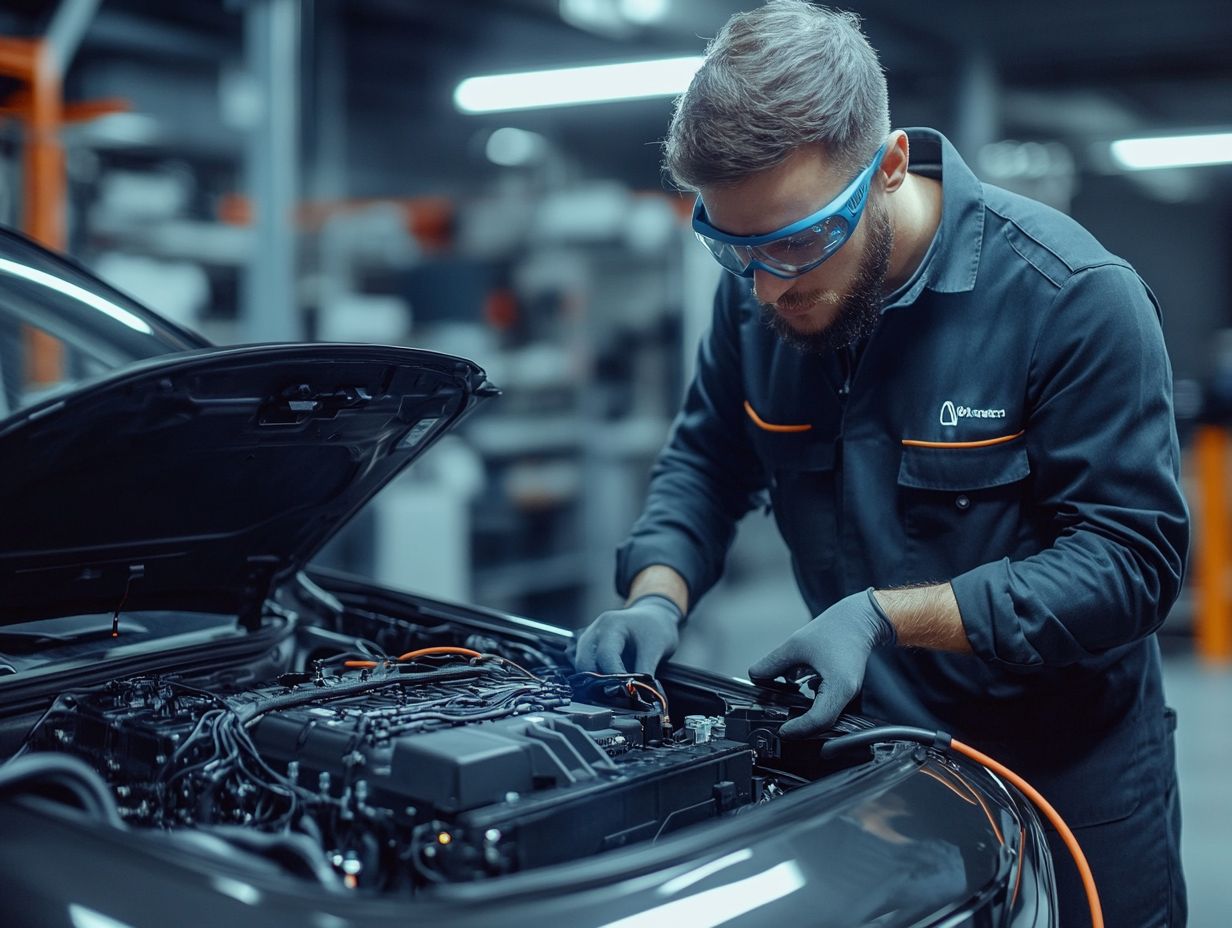
Maintaining an electric vehicle requires a thoughtful blend of regular service appointments and attentive monitoring of performance. Adherence to specific maintenance tips elevates your overall driving experience.
Be proactive and schedule regular maintenance checks! Ensure that essential components like tires, brakes, and fluids are routinely assessed and kept in peak condition.
Following these guidelines not only extends the lifespan of your vehicle but also enhances your driving experience with energy efficiency and a low-noise ride.
Tips and Tricks for Long-Term Maintenance
Long-term maintenance for your electric vehicle is all about implementing a few key practices that will ensure optimal performance and longevity. This means regularly monitoring your tire pressure for those performance tires and keeping an eye on your mileage for scheduled service appointments.
By understanding the details of battery replacement as your vehicle ages, you can significantly extend the life of your electric car while improving your overall driving experience. Maintaining the correct tire pressure boosts your vehicle s efficiency and enhances handling and safety.
Ideally, you should check your tire pressure once a month to prevent uneven wear and maximize your range. Systematically tracking your mileage allows you to follow the manufacturer s maintenance schedule, ensuring that essential services, particularly for brake systems and fluid levels, are performed right on time.
Regarding battery replacement, staying informed about your battery s health and performance metrics can help you spot potential issues before they escalate. By using diagnostic tools or apps, you can anticipate when it s time for a new battery, making that transition smoother and more cost-effective.
Common Misconceptions about Electric Vehicle Maintenance
Amid the rising popularity of electric vehicles, you may encounter several misconceptions about their maintenance that could mislead both potential buyers and current owners.
One common myth suggests that maintaining an EV is significantly more expensive than caring for traditional gasoline cars. In reality, many find that regular service appointments and lower repair costs often tell a different story.
Grasping these misconceptions is crucial for making informed decisions about warranty claims, which are requests for repairs under the warranty, and the ongoing care of your vehicle.
Debunking Myths and Addressing Concerns
It’s important to address concerns and debunk myths about electric vehicle maintenance. Many believe that EVs need frequent, specialized maintenance or have high repair costs, but this is usually not true. For those looking for reliable advice, consider these top 5 maintenance tips for electric vehicles.
By clarifying misconceptions about the maintenance schedule and options, you’ll be in a better position to make informed decisions.
Electric vehicle maintenance actually requires less upkeep than traditional gas cars. EVs lack the conventional engine parts that need routine oil changes, but it’s still important to know how often to service my electric vehicle for optimal performance.
A study shows that electric vehicles can save you up to 50% on maintenance costs over time. Many EVs also come with 8-year warranties on their batteries, which reduces worries about expensive repairs.
Regular inspections mainly focus on tires, brakes, and software updates. These areas are highly accessible and affordable.
Frequently Asked Questions
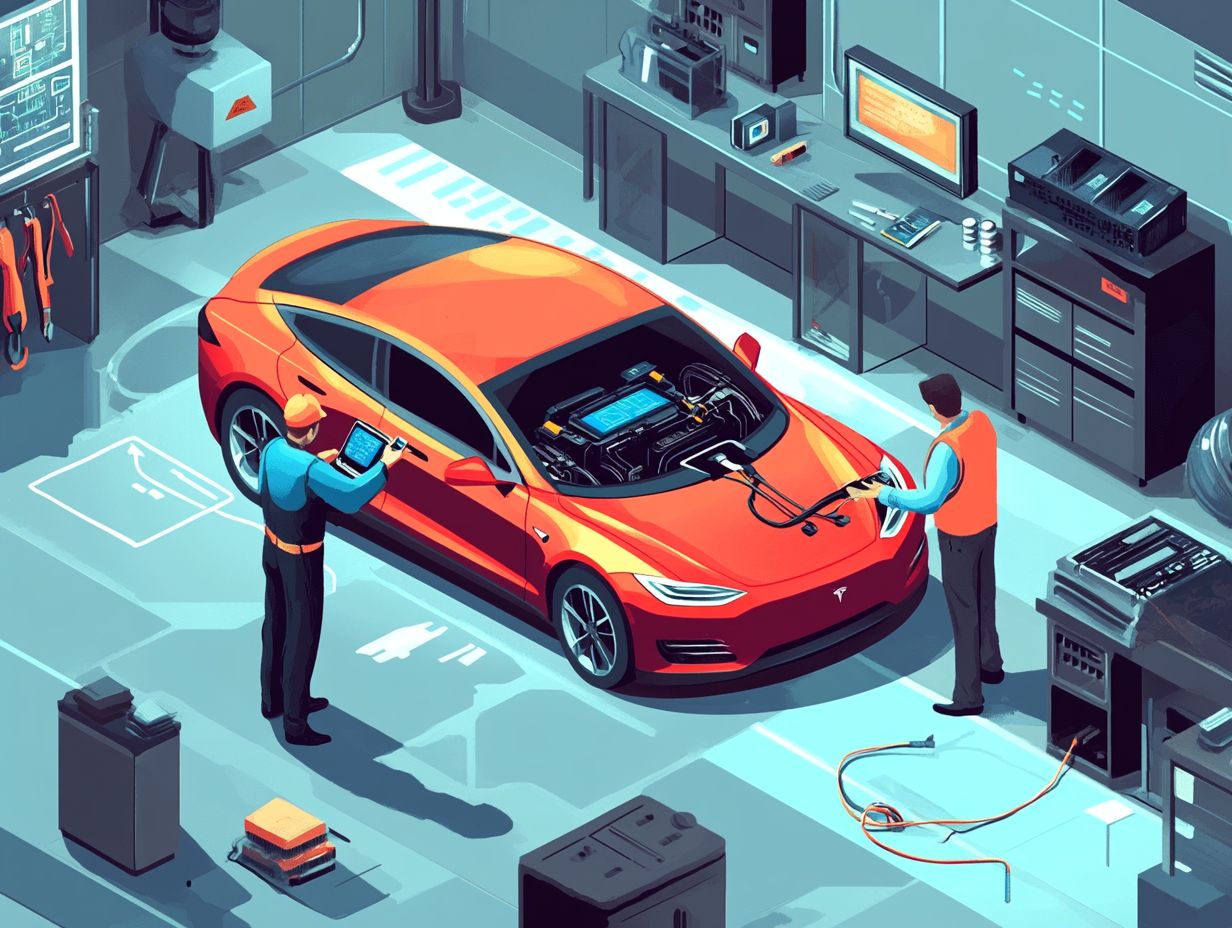
Do electric vehicles require special maintenance?
Yes, they need specific care that differs from gasoline vehicles.
What kind of maintenance do electric vehicles need?
They need routine checks for their battery, motor, and charging system, along with tire rotations and brake inspections.
Do electric vehicles have fewer maintenance needs compared to gasoline vehicles?
Generally, yes. Electric vehicles have fewer moving parts, leading to less maintenance. However, essential maintenance for used electric vehicles is still crucial for their performance.
How often do I need to maintain my electric vehicle?
Maintenance frequency can vary by make and model. Most manufacturers suggest servicing every 7,500 to 10,000 miles or once a year.
Is maintenance for electric vehicles more expensive than gasoline vehicles?
This depends on specific tasks and the vehicle type. Initially, costs might be higher due to special equipment, but long-term costs may be lower.
Can I perform maintenance on my electric vehicle myself?
You can handle basic tasks like tire rotations and brake checks, but it’s best to have a certified technician handle more complex maintenance.


